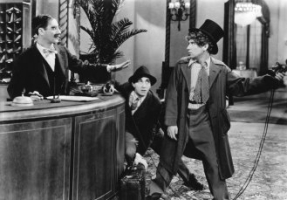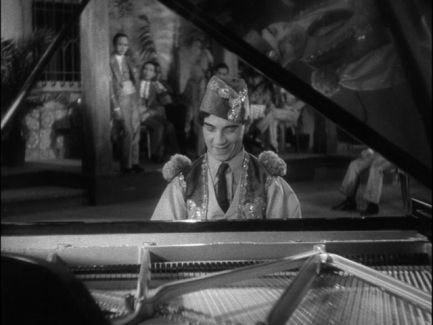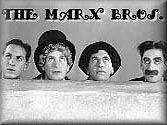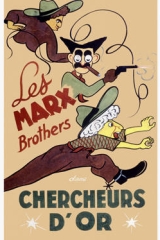 THE
COCOANUTS
THE
COCOANUTS
(1929)With Groucho Marx, Harpo Marx, Chico Marx, Zeppo Marx, Margaret Dumont, Mary Eaton, Oscar Shaw, Kay Francis, Cyril Ring
Directed by Robert Florey and Joseph Santley
Black and White
Reviewed by JL and JB
One of the most important and
ambitious of the
early talkies, THE COCOANUTS was also the Marx Brothers' first
film. It suffers from the restrictions of early sound
technology,
such that this reasonably faithful adaptation of the brothers' Broadway
stage success looks like it was filmed by your Uncle Murray with his
jiggly 8mm camera (and that yappy little dog of his that always peed on
everyone's leg, but that's a story for another time). The
Marxes (except Harpo) seem a bit inhibited by the limitations of the
camera and microphone, but they provided enough moments of high
hilarity for the world to see what all the fuss over the Marx Brothers
was about.  ½ - JL
½ - JL
 In 1929, The Marx Brothers signed with Paramount to film a talkie of
their Broadway hit THE COCOANUTS. As they were currently performing on
Broadway in the stage play ANIMAL CRACKERS, they
made the film at Paramount's Long
Island studio in Astoria, New York, filming on days when they didn't
have matinee performances.
In 1929, The Marx Brothers signed with Paramount to film a talkie of
their Broadway hit THE COCOANUTS. As they were currently performing on
Broadway in the stage play ANIMAL CRACKERS, they
made the film at Paramount's Long
Island studio in Astoria, New York, filming on days when they didn't
have matinee performances.
The film, as seen today, is a
patchwork print
from several sources, some of them obviously in bad shape. The Marxes
themselves seem at times unsure of their dialog (the silent Harpo
obviously excepted) and frequently stumble or hesitate during lines, so
much so that you begin to wonder why director Robert Florey didn't ask
for a retake. And more than any other Marx Brothers film
except
for A DAY AT
THE RACES (1937), THE COCOANUTS stops frequently for
intrusive musical interludes. In RACES, the songwriters and
filmmakers were so undecided what song they should promote as the hit,
they shoved four or five of them into the film. In THE
COCOANUTS,
it is obvious which of Irving Berlin's songs was being pushed - the
dreary "When My Dreams Come True". It is sung or played so
many
times in the film that you either develop an odd affection for it like
I have, or you may start feeling like the killer in Peter
Bogdonavich's TARGETS and just want to get out and hurt some people
until the pain goes away. As Joe Adamson said in Groucho, Harpo, Chico and
Sometimes Zeppo, "Irving
Berlin didn't have a hit song in THE COCOANUTS, and this was it."
When the film is not stopping to plug "When My Dreams Come True", it's stopping to explain the plot, and explain it again. So much is made of a stolen necklace, a mysterious map to a certain plot of land, and a detective snooping around for reasons unknown, midway through the film you may start feeling guilty about not caring a damn about any of it. Here's the deal: the bad guy and girl want in on the rich woman's dough, so they frame her daughter's boyfriend so that the good daughter will marry the bad guy. That's it. Now bring on the Marx Brothers.
For it is only the fact that
the Marx Brothers
are in this film that save it at all. Even though Groucho's
delivery is
sometimes halting, he still gives enough to make the jokes funny.
With
a script by George Kaufman and Morrie Ryskind, and much of the dialog
"written" by the Marxes themselves (ad-libs from the stage incorporated
into the script), the comedy routines are quite good, if not always up
to par with some of their later classics. The most famous, known
as
"Why a Duck?", has plenty of good lines but is really just a fun
precursor to some of Groucho and Chico's great later routines, such as
almost any
scene in MONKEY
BUSINESS or HORSE FEATHERS. At its best, the silliness of THE
COCOANUTS is highly contagious. Typical is the moment when
Chico
sits down at the piano and Margaret Dumont asks him what the first
number is. "Number One!" he exclaims proudly.
This is the
first film the
inimitable Margaret Dumont did with the Brothers, and she is an
excellent foil as she always will be, though much stiffer and stuffier than she
would be later on. In later films, she occasionally enjoys Groucho's
jokes; in THE COCOANUTS, she is continually flustered and confused
throughout. For Zeppo fans (and you know who you are), his
role
consists mainly of not being on screen much of the time, and he does it
very well.
THE COCOANUTS, on any level, remains a
historically
intriguing artifact from a time when talkies were brand new and the
idea of adapting a full scale Broadway musical was still relatively
untested. Its entertainment value, though, rests completely on five
things - the four Marx Brothers, and your tolerance for a little ditty
called "When My Dreams Come True". The Marxes were to do significantly
better with their next film made in Astoria, the classic ANIMAL
CRACKERS (1930)  -
JB
-
JB
(Review adapted from a previously published article - JB)
The Marx Brothers The Age of Comedy
ADD ANOTHER
QUOTE AND MAKE IT A
GALLON
"Oh, Mr. Hammer - there's a man outside wants to see you with a black
mustache."
"Tell him I've got one."
Notes by John V. "Jay" Brennan
A BOW FOR HARPO AND CHICO
Harpo's solo: "When My Dreams Come True" (Irving Berlin). He plays this tune twice in the film; once on clarinet, once on his harp.
Chico's solo: "Gypsy Love Song" (Victor Herbert, music; Harry B.
Smith, lyrics) from the 1898 operetta The Fortune Teller. The
operetta wasn't one of Victor Herbert's biggest hits, but the song caught on and became a standard.
A CUP OF COFFEE,
A SANDWICH AND YOU
(From the Opera I-Eat-a)
The stage play THE COCOANUTS premiered at the Lyric Theater in NYC on
December 8th, 1925.
Because of the extreme sensitivity of the early sound microphones,
every piece of paper used in THE COCOANUTS had to be soaked with
water. This can be most easily seen during the famous "Why a
Duck?" scene, which features an obviously soggy map.
Harpo's wig looks darker in this film than in any subsequent
film. After THE COCOANUTS, the red wig he normally used was
replaced with a lighter one, most likely a light red one which photographed as blonde.
Legend has it that Irving Berlin's score for THE COCOANUTS was the only
time the music he wrote for a Broadway show did not produce at least
one hit song.


